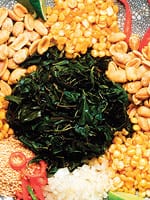|
Tuesday, January 6, 2015. In an article published on December 17, 2014 in Nutrition Journal, Korean researchers report a beneficial effect for increased B vitamin intake on cognitive function in individuals with mild cognitive impairment (MCI) and Alzheimer's disease.
The study included 100 men and women with mild cognitive impairment, 100 Alzheimer's disease patients and 121 cognitively normal individuals aged 60 years and older. Participants completed eight tests of cognitive function, including MMSE-KC, Boston Naming Test, Verbal Fluency, Word List Memory, Word List Recall, Word List Recognition, Constructional Recall and Constructional Praxis. Interview responses provided data concerning dietary intake from food and supplements the day prior to blood analysis of B vitamin and homocysteine levels.
Higher total intake of vitamins B2, B6, B12 and folate was associated with lower plasma homocysteine levels. When intake from diet alone among all subjects was examined, increased consumption of vitamin B2 was associated with improvement in Constructional Recall Test scores, and those whose vitamin B6 intake levels were greater had better Boston Naming Test and Word List Memory scores. Higher folate intake was associated with better Word List Memory and Constructional Recall scores.
Analysis of total intake of B vitamins from diet and supplements revealed improvement in MMSE-KC and Boston Naming Test scores in association with increased vitamin B2 intake, better Boston Naming Test scores in association with total vitamin B6 intake, and improvement in three of the eight test scores in association with increased folic acid intake. When Alzheimer's disease patients were examined, greater total intake of vitamins B2, B6, B12 and folic acid were individually associated with numerous improved scores. Those with mild cognitive impairment also experienced better test scores in association with vitamins B2, B6 and folate, although the number of tests that showed improvements was fewer than that of the Alzheimer's disease group. Among those with normal function, no associations between test scores and any of the dietary parameters examined were observed.
"To the best of our knowledge, this is the first study investigating the relationship between cognitive function scores and dietary intake by cognitive status," Namsoo Chang of Ewha Womans University in Seoul and colleagues announce.
They note that previous research has confirmed a correlation between lower homocysteine levels and increased B vitamin intake. "Folate, vitamin B2, vitamin B6 and vitamin B12 are involved in one-carbon transfer reactions such as methylation, which is necessary for the production of monoamine neurotransmitters, phospholipids and nucleotides in the brain," they write. "Low levels of these B vitamins have been associated with increased homocysteine, known to have a direct neurotoxic effect."
"These results suggested that total B vitamins intake is associated with cognitive function in cognitively impaired Alzheimer's disease and MCI elderly, and the association is stronger in Alzheimer's disease patients," they conclude.
|
|







